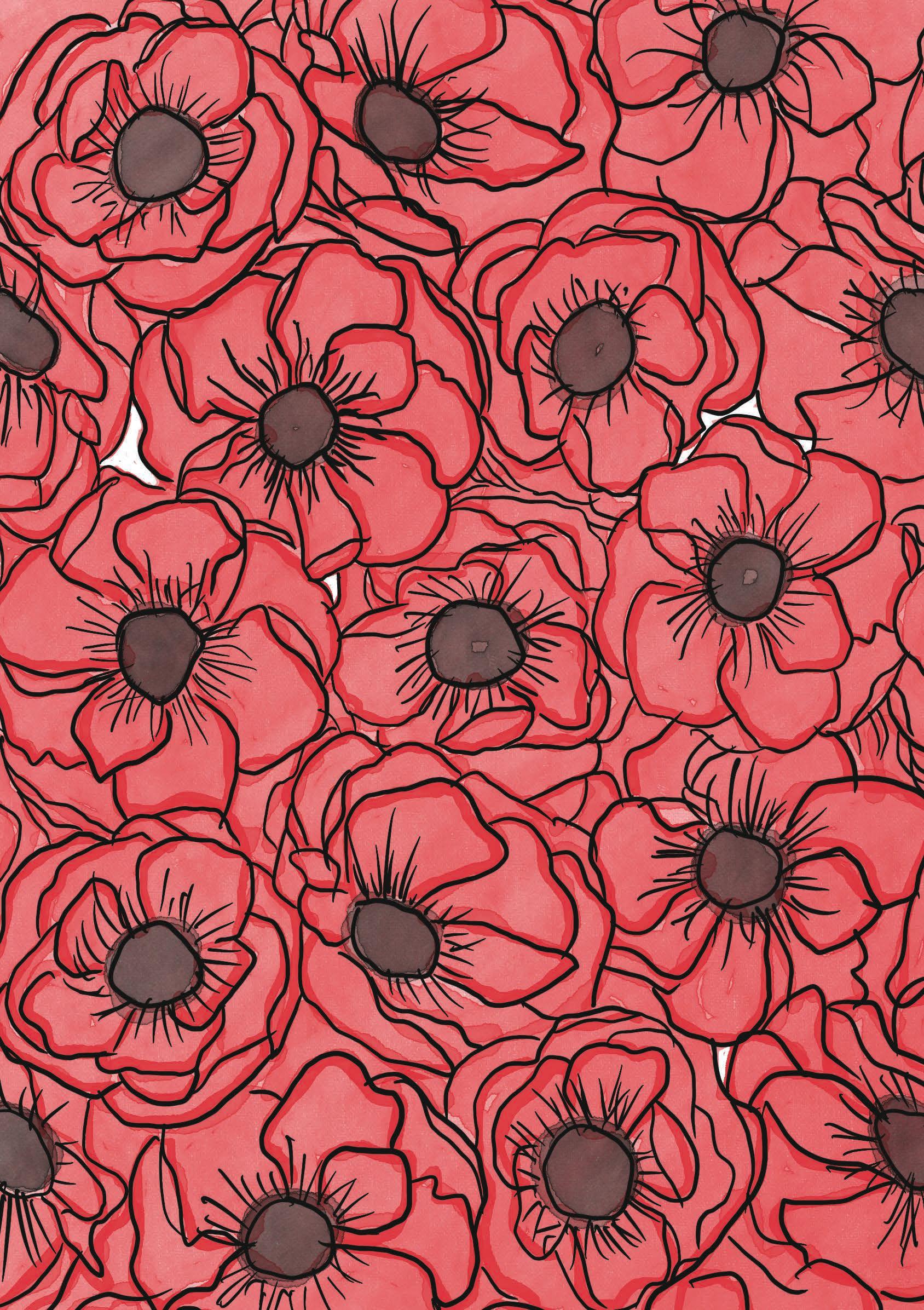




By John McCrae
In Flanders fields the poppies blow
Between the crosses, row on row, That mark our place; and in the sky
The larks, still bravely singing, fly Scarce heard amid the guns below. We are the Dead. Short days ago We lived, felt dawn, saw sunset glow, Loved and were loved, and now we lie, In Flanders fields.
Take up our quarrel with the foe: To you from failing hands we throw
The torch; be yours to hold it high. If ye break faith with us who die We shall not sleep, though poppies grow In Flanders fields.
The Salvation Army is about giving hope where it’s needed most.
What is The Salvation Army?
The Salvation Army, an international movement, is an evangelical part of the universal Christian Church.
Vision Statement
Wherever there is hardship or injustice, Salvos will live, love and fight alongside others to transform Australia one life at a time with the love of Jesus.
Mission Statement
The Salvation Army is a Christian movement dedicated to sharing the love of Jesus by:
• Caring for people
• Creating faith pathways
• Building healthy communities
• Working for justice

The Salvation Army Australia acknowledges the Traditional Owners of the land on which we meet and work and pay our respect to Elders, past, present, and future. We value and include people of all cultures, languages, abilities, sexual orientations, gender identities, gender expressions, and intersex status. We are committed to providing programs that are fully inclusive. We are committed to the safety and wellbeing of people of all ages, particularly children.
Founders William and Catherine Booth
Salvation Army World Leaders
General Lyndon and Commissioner Bronwyn Buckingham
Territorial Leader Commissioner Miriam Gluyas
Secretary for Communications and Editor-In-Chief
Colonel Rodney Walters
Publications Manager Cheryl Tinker
Editor Simone Worthing
Graphic Designer Ryan Harrison
Enquiry email publications@salvationarmy.org.au
All other Salvation Army enquiries 13 72 58
Press date 25 October 2024
Printed and published for The Salvation Army by Commissioner Miriam Gluyas at Focus Print Group, South Granville, NSW, Darug Nation lands.

salvosonline.org.au

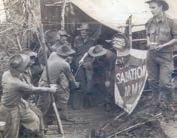
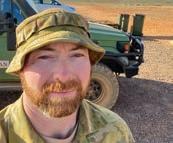
At 11am on 11 November every year, Australians are encouraged to stop whatever they are doing, observe two minutes’ silence, and remember those who have died or suffered for their country in all wars and armed conflicts – and those who continue to serve today.
The sacrifice of war is difficult to reflect upon. It’s even more difficult when we know that H.G Wells’ prediction – that World War One would be the ‘war that will end war’ –was wrong. Agonisingly wrong. There are currently 56 conflicts in the world today, with 92 countries involved in conflicts outside their borders (visionofhumanity.org).
If we don’t stop to remember the suffering of people in past and present wars and conflicts – those who fought and those caught up in combat’s horrific consequences – they will fade from our memories and consciences.
In this edition, we focus on the work of the Salvos in conflicts worldwide. Since 1899, Salvos representatives have been offering spiritual and emotional comfort, as well as a ‘cuppa’ and snacks, to servicemen and women in times of war and peace.
Lest we forget.
Simone Worthing Editor
For 125 years, The Salvation Army’s Red Shield Defence Services (RSDS) have stood shoulder to shoulder with soldiers, providing invaluable support in times of conflict.
Since 1899, the Salvos have faced the challenges of war across the globe, serving in many capacities. They’ve enlisted as combatants, musicians, nurses, sailors, pilots, mechanics and in other roles. Many have also become military chaplains or Red Shield representatives, serving their country and their faith.

From the Second Boer War and the two World Wars to conflicts in Malaya, Korea, Vietnam, Cambodia, Somalia, East Timor and the Middle East, Australians and the Salvos have shared a deep bond in times of need.
In a preserved voice recording, Captain James ‘Eddie’ Cooper spoke of his work as a Salvation Army welfare
representative on the Kokoda Trail. “I still did a bit of work up [at], Owen’s Corner, which is part of the track up the Kokoda Trail. It was a very, very steep mountain, really, and you climbed down to the bottom of this and then got on to the track...

When we reflect on the stories of those in wars and conflicts, we see a clear bond between Australians and the Salvos…
“And I used to take supplies up, but the troops were still coming out either sick or injured, wounded. And the supper’s a real godsend in many respects. And if they can stop there, have a rest, get a cup of coffee and something to eat, and then tackle this very, very steep climb up the place.”
When we reflect on the stories of those in wars and conflicts, we see a clear bond between Australians and the Salvos – often known as the Sallyman and Sallyma’am – a connection forged over a brew and mutual respect.
Today, the Red Shield Defence Services know the smallest act still makes a difference.



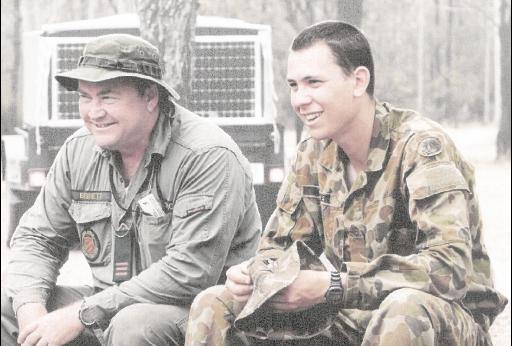


life better for each of the individuals, the soldiers, the partners, to bridge that gap between military life and civilian life, make a difference where we can, make a difference out field, and I think the mandate is to help soldiers and their families in any way we can,” says Major Mairi Mitchell, Senior RSDS Representative.
Brigadier John McCabe OBE (19132009) joined The Salvation Army at the age of 20 and within a few years was serving as a Sallyman, supporting the Australian Defence Forces in the Middle East, Ceylon, Korea, Papua New Guinea and Australia.
“Some years later after the war, I went over to Japan with the Commonwealth Occupation Force,” he wrote. “I went to a Salvation Army Sunday night meeting [church service] conducted in Japanese. A Sunday school superintendent … acted as an interpreter for us.
“The realisation hit me that night that here was I, a chap who, during the war, didn’t feel any compassion towards the Japanese because of what they
had done. But I was sitting beside this Japanese [man] who, during the war years, was a bomber pilot.
“And yet, here we were, in a Salvation Army meeting, all at one.
“And that’s where I realised that Jesus said, “Love your enemy … and do good to them that despitefully use you,” (Matthew chapter 5, verse 44). In Christ there is no east or west, south or north, but one great fellowship throughout the whole wide earth.
“So, I suppose if there was a moment of reconciliation for me, it was that night.”
As we reflect on the last 125 years of Red Shield Defence Services, we see that as long as humanity exists, so will hardship and injustice. And as long as the Salvos exist, we will be there to walk alongside others with the love of Jesus.
Scan here for the full video version of this story.

Not your average 70th birthday celebration
By Fay Foster
There are many ways to celebrate a 70th birthday – family, friends, cake, a meal or a party.
Not so for retired Salvation Army officer Colonel Kelvin Alley, who marked his 70th birthday in September on day 17 of a 20-day Adelaide to Gold Coast Solo Cycle Classic, raising money for the charity Wandering Warriors.
Wandering Warriors is a not-for-profit ex-Service organisation and registered charity that supports veterans of Australia’s Special Operations Command and their families transitioning from military to civilian life. As time and resources allow, assistance is also extended to the wider veteran community.
Kelvin’s interest in supporting Wandering Warriors is an extension of his ongoing relationship with the Australian Armed Forces. Since 2006, he has been part of the ‘Pollie Pedal’, an annual bike ride of 1000km over eight days, that started as a means of getting politicians out and doing something active to benefit the community. For the five years to 2022, the Pollie Pedal supported the charity Soldier On, which supports veterans and their families. This changed in 2023 to support Wandering Warriors.
Since their retirement in 2020, Kelvin and his wife Julie have taken on the role of chaplains to the Runaway Bay RSL Sub-Branch on the Gold Coast. Their son is a triple veteran of Australian Defence Force service in Afghanistan.
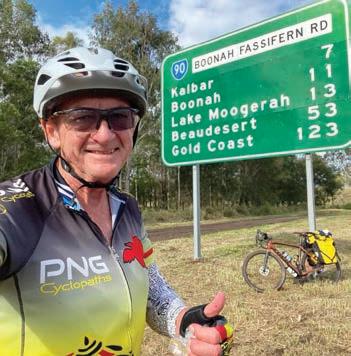
During this year’s ride – his third solo trip to raise money for defence force-related organisations – Kelvin crossed the Mallee, the Hay Plains, the Liverpool Plains and the high country over the top of the Great Divide, conquering Cunningham’s Gap along the way. He called in to over 60 military memorials, including the silo art at Walpeup, created as a tribute to the Australian Light Horse.
Kelvin says that the highlights of the ride were the beautiful scenery, the numerous tiny towns steeped in history, and the careful, considerate behaviour of drivers who gave the bike a wide berth when overtaking.
Kelvin had to plan each day’s ride, taking into account road types and the distance between towns. He tried to
limit each day’s ride to 130km, but there were a few days of more than 150km
The bike also carried 25kg of clothing, equipment, medical supplies, power packs, and snacks.

What started as an idea to celebrate my 70th birthday became so much more.
On the final day of the trip, Kelvin was joined at 5am by Quentin Mason, CEO of Wandering Warriors, who kept him company for the last (110km) leg of the ride, terminating at the Soldiers Memorial at Upper Coomera. A welcoming party, including State Member Mark Boothman and the head office team of Wandering Warriors, showed their appreciation for Kelvin’s achievement and gratitude for the funds raised.


At the end of his epic ride, which raised $10,555 for Wandering Warriors, Kelvin said, “I am grateful to the 110 people who sponsored, and to those who still have intention to support a most worthy cause … The great ride is over – with 13,000m of climbing, and 60 memorials visited, there wasn’t so much as a flat tyre!
“What started as an idea to celebrate my 70th birthday became so much more – an amazing adventure – a journey through history – a deepened love of my country, its people, my faith and some well-deserved attention and support for Wandering Warriors who support veterans and families of our Special Forces!”
Scan here for more stories of hope.
By Lindsay Cox
Sixty years ago, when I was a young infantry ‘Choco’ skirmishing around in the heat and the dust of Scrub Hill, Puckapunyal, I bumped into a Land Rover parked under a gum tree, where a Salvo bloke was handing out drinks of cold cordial to my fellow Citizen Military Forces mates. I still remember how satisfying that drink was!
The story of The Salvation Army’s temporal (and spiritual) care for members of the Australian Defence Forces goes back to the Boer War in South Africa in 1899, when Adjutant Mary Murray and a relief party of ‘Troop-work Officers’ were sent to minister comfort and practical aid to the men of both sides of the conflict.
In World War One, Adjutant Robert Henry was sent to France where he established a ‘Hot Coffee Joint’ within the range of the enemy’s artillery and located at a busy intersection with a constant stream of khaki-clad men passing.

In 1995, I oversaw The Red Shield History Project and gathered 184 oral history interviews, which resulted 25 years later in the publishing of Cuppa Tea, Digger? that recounted many stories about the ubiquitous Salvo ‘cuppa’.
This ‘cuppa’ followed the Australian servicemen to conflicts in Korea, Malaya, and Borneo, and later to Vietnam, Cambodia, Somalia and East Timor. The modern-day Sallyman and Sallyma’am continue their commitment to this, the 125th year of serving the men and women of the Australian Defence Force.
As Remembrance Day approaches, we remember the service of the men and women of the Red Shield Defence Services (RSDS) and their forebears, just as we recall the suffering and sacrifice of all those who have experienced war.
Still Serving, the prequel to Cuppa Tea, Digger?, tells the story of the early days of The Salvation Army’s philanthropic attachment to the military. It honours the 125th anniversary of the RSDS and will be launched at a celebratory dinner at the Australian War Memorial on Thursday 7 November.
Lindsay Cox is the manager of The Salvation Army Museum in Melbourne.

Scan here to order a copy of Still Serving.

Tim Costello reflects on his experience at Gallipoli and remembers soldiers past and present while we hope for peace
On the 11th day of the 11th month, 1918, the guns fell silent. After 20 million deaths and 21 million wounded, it was declared the war to end all wars. Never again.
To that end the League of Nations was created, but it failed. Twenty-one years after that first Remembrance Day, World War Two claimed 70-85 million lives.
After it finished in 1945, the United Nations was created to prevent wars.
But this Remembrance Day almost 80 years later, the bombs and guns are blazing again. How do we end wars and honour the purpose of Remembrance Day?
Last year, my wife and I were leading a Christian tour group to Türkiye and had a day at Lone Pine Cemetery, Gallipoli. We stood reverently in the shade of the lone pine tree that stands there as a sentinel, surrounded by the graves of young Australian men.
Members of our group shared about the intergenerational family trauma that was the legacy of grandparents who had fought in these hills and valleys.
There were tears and hugs and then we sang together the chant, “O Lord, remember them when you enter into your Kingdom.” That is remembrance.
As are the ceremonies at shrines and war memorials around the nation where we honour the “mighty dead”, listen to the Last Post, and hear proclaimed: “At the going down of the sun, we will remember them.”
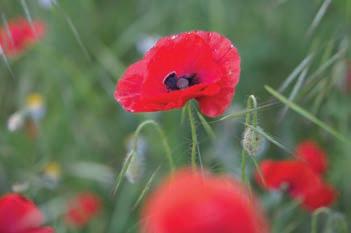
But this Remembrance Day, I will pray for the families of the more than 44,000 Palestinians – 40 per cent children – and the more than 1700 Israelis now killed. And the more than 200 UN officials killed in Gaza: the highest UN loss in a single conflict.*
War never achieves what we think it will. Jesus was right. Blessed are the peacemakers.
“Blessed are the peacemakers –they will be called children of God.”
Matthew chapter 5, verse 9 The Voice Bible translation
*There are more than 56 conflicts around the world today.
Tim Costello, a Baptist minister, is the Director of Ethical Voice, Executive Director of Micah Australia and a Senior Fellow at Centre for Public Christianity.
This article first appeared at the Centre for Public Christianity (publicchristianity.org)
By Brett Gallagher
We acknowledge God, the Creator of heaven and earth and God’s ownership of all things. We recognise that God gave stewardship of these lands upon which we gather to the Aboriginal and Torres Strait Islander Peoples of this country.
We pay our respects to these traditional custodians and their elders, past and present, and emerging. We are thankful for the knowledge they hold that has sustained and protected this country since God created it.
I would also like to acknowledge the long and proud history of Indigenous service where Aboriginal and Torres Strait Islander men and women have contributed, and still contribute, to the defence of our nation in times of peace and war.
We acknowledge their cultures and connection with this land, waters and sky and are thankful for the community that we now share. We commit to building a brighter future through reconciliation, unity, equity and mutual flourishing.
COMMEMORATION PRAYER
Loving Triune God,
We gather to remember the sacrifices made by countless serving men and women in times of peace and conflict. We recognise the courage, determination, and commitment of those who have fought for our country, seeking justice, freedom and peace for all.
We pray for those who have survived conflict, especially those who carry the scars of their service in their souls, minds and bodies. Be with them. Strengthen and encourage them. Let them know that there are people committed to standing alongside them to see them well.
We remember those, mainly women and children, who suffered and continue to suffer, just because they happened to
be in a conflict zone. May they know you are with them and the peace of mind that comes with your presence.
Be with the heartbroken – the spouses, parents, families and friends, who endure the grief of knowing their loved ones will never return. Bring them comfort and peace, we pray.
We grieve for those who have been so destroyed by what they experienced in service of their country that they have found no other option but to end their lives. We cannot understand the deep pain that they carried. Be with those who loved them – those left behind who continue to be impacted by their death. May they, through your Holy Spirit, know your grace, comfort and peace.
We also pray for those who struggle
with their service, be that in the past or the present. Be with them today. Give us the strength and assurance that we can walk alongside those who are struggling and offer them reassurance and hope in our actions and words.
May we, in our families and communities, strive to practise reconciliation, understanding and peace each day to bring about the transformation of our world. May we continue to build a nation where our differences are embraced as strengths, where our workplaces are free from harassment and discrimination, and where we resolve to seek the wellbeing of all peoples who make this land their home.

Give us the wisdom and strength to build a better world.

May your grace enable us this day to dedicate ourselves to the cause of justice, freedom and peace; and give us the wisdom and strength to build a better world.
We pray this in the name of the Father, Son and Holy Spirit, Amen.
Major Brett Gallagher is the Chief Commissioner of the Red Shield Defence Services, based on Ngambri and Ngunnawal Country, Canberra.
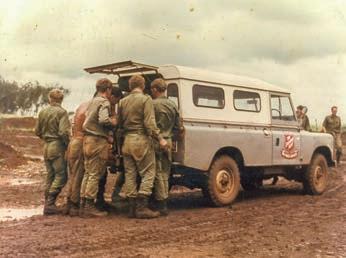
Scan here for more stories of hope.
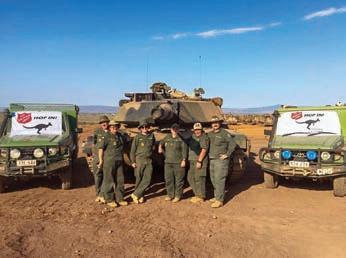
By Vaughan Agnew
At 18, I decided to join the Australian Defence Force. I spent four years, one month and seven days in Defence.
In 2005, I was on a pre-deployment list to go overseas, and I had a bit of wax in my ear. The doctor syringed my left ear, and perforated my ear drum, which then meant being discharged from the army.
I spent 12 years in and out of jobs. I just didn’t find where I was meant to be.
In 2018, I was on board as a Sallyman – part of a group of Salvation Army ministers, men and women, who serve in the Red Shield Defence Services team caring for defence personnel and their families on bases around Australia.

Basically, our role is to work with the soldiers in a field environment and in a barracks environment. It’s generally frontline units that we look after. I look after the 1st Armoured Regiment.
I remember I was due to drive to Darwin from Adelaide – a journey of 3000km –for an exercise. Before I went, my wife was like, “Where are you going to sleep? On the side of the road?” We decided that we’d get a rooftop tent for the truck. It was a phenomenal exercise and really hot. And we were out from 5am, boiling 60 litres water [for tea and coffee] to like 6pm, 7pm.
It was a horrible track to drive to where I had to go. It was a hard slog, but they appreciate it so much.
When we were all back home, they put on a barbecue and a fundraiser. I didn’t know what the fundraiser was for.
And at the end of the night, they presented me with a cheque for the cost of the rooftop tent and they said, “Vaughan, we just want to thank you for everything that you have done for us, especially over in that exercise in Koolendong.”
What the tent allows me to do is to come out onto this range, or anywhere in Australia, in the evening, put up my rooftop tent and just hang with them. Go to sleep there, wake up in the morning and just be there for those chats. Be there for those chats after the sun goes down.

We have an awesome opportunity to be able to speak into the lives of some of the soldiers. And even though it’s a predominantly non-Christian environment, those faith conversations happen all the time.
Without the Sallyman, we’d very much be a different army.
and speak to them and just talk things through with someone that is outside of chain of command that they might feel a little bit more comfortable speaking to.”
“It’s a very important support network that we rely on to get us through these training exercises,” said soldier Stirling. “And it’s really amazing to have that around us.”
“Pretty much every time you hear on the radio that the Sallyman’s coming, everyone pretty much stops work and gets ready to chill out, have five to 10 minutes to relax. It’s definitely the break you didn’t know you needed until he rocks up,” said soldier Vanessa.
Another soldier, Chris, values the availability of the Sallyman. “Any soldier, any person from any rank can go up to and just have a chat to them,” he said. “Or, if they’re having issues, just need to get something off their chest, they can go
Soldier Jordan agrees. “If you don’t think you need the Sallyman, I think you just haven’t experienced times out here, ‘cause he’s a massive morale booster, especially when you’ve been tied down for a couple of days and haven’t had the chance to have those open chats, have that brew, and it’s just massive.
“Just to see the smile on all the troops’ faces when Vaughan turns up for the day, it’s great. And yeah, without the Sallyman, we’d very much be a different army.”
Scan here for more information on Salvation Army services.
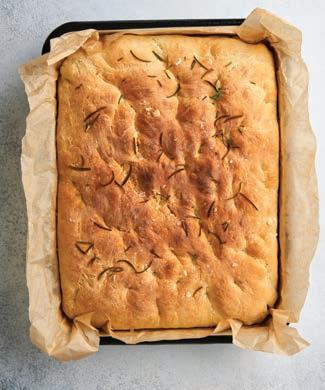
Ingredients
Step 1:
1 apple; 2 sprigs fresh rosemary; 1 tsp sugar; zest and juice of ½ lemon; 1 tsp butter
Step 2:
225g butter; ¾ cup sugar; 3 eggs; 2 cups self-raising flour; 1 tbsp sugar
Method
• Step 1: Peel, core and chop apple. Place in saucepan with one sprig rosemary, sugar, lemon zest and juice, and butter.
• Cover and cook on low for 8 minutes until apple is soft. Cool and remove rosemary when cold.
• Step 2: Preheat oven to 170°C. Mix apple, butter, ¾ cup sugar, eggs and flour. Spoon into greased cake tin, sprinkle sugar and rosemary on surface of cake.
• Bake 50 minutes. Cool on rack.

What did the artist say to his canvas?
Why did the artist paint a picture of a tree? I’ve got you covered!
He didn’t want to get tide down. He wanted to make a splash. He wanted to branch out.
Why did the painter refuse to paint the ocean?
Why did the painter switch from oil paints to watercolours?

SHOUTOUT TO EVERYONE WHO CAN STILL REMEMBER THEIR CHILDHOOD PHONE NUMBER BUT CAN’T REMEMBER THE PASSWORD THEY CREATED YESTERDAY. YOU ARE MY PEOPLE.
Fill in the grid so that every row, every column and every 3x3 box contains the digits 1 to 9.
1. Why is Remembrance Day held on 11 November?
2. What flower is commonly worn for Remembrance Day?
3. Which monarch oversaw the first Remembrance Day memorial?
4. World War I officially ended with the signing of which treaty?
5. At what time is a minute’s silence held on Remembrance Day?
6. Who wrote the poem In Flanders Fields?
7. In what year did World War I end?
On which page of this week’s Salvos Magazine is Tum-Tum hiding?

“See that justice is done and be kind and merciful to one another”
Zechariah chapter 7, verse 9b Contemporary English Version
8. What does ‘cenotaph’ mean?
I am said to epitomise the Renaissance man.
Who am I?
I am an artist, architect, inventor, engineer, mathematician, sculptor and geologist. I invented the parachute, helicopter and the use of concentrated solar power.
I painted The Last Supper.
